- Details
1. Introduction
ACCAN was formed as a peak body for consumers and consumer organisations on communications issues, including telecommunications and the internet. ACCAN has a central role in advocacy, research, training, consultation, the provision of policy advice and consumer education. One specific function of ACCAN is to administer the distribution of funding previously allocated by the Department of Broadband, Communications and the Digital Economy (section 593 grants).
Individuals and organisations joining ACCAN retain their identity and are able to advocate on their own or their members’ behalf. ACCAN is an important forum in which consumer concerns and views can be debated and shared and, as much as possible, resolved.
The overarching objective guiding ACCAN is to ensure that communications are available, accessible and affordable for all Australians.
The ACCAN constitution was created in 2008 and was last amended in 2023.
- Details
Vince Humphries, Chairperson

Vince worked in communications regulation for over 30 years, most of that time with the Australian Communications and Media Authority (ACMA) and its predecessors. In his various roles, he dealt with most aspects of telecommunications regulation, together with regulation of online content, spam and telemarketing calls.
In the area of telecommunications regulation, Vince led the ACMA’s efforts to drive a stronger emphasis on telco compliance with consumer safeguards, develop a range of consumer safeguards specific to the NBN, introduce publication of regular reports on complaints received by telcos and on how telcos deal with financial hardship, and a range of initiatives focusing on consumers in vulnerable circumstances.
Vince drove the use of research commissioned by the ACMA and by major research organisations to inform the ACMA’s strategic priorities related to consumer protection. He also worked for 3½ years with the European Communications Office, based in Denmark, supporting the work of European communications regulators related to numbering, addressing and next generation networks.
Vince has a strong and long-standing interest in consumers having access to reliable and quality communications services, the protection of rights of consumers in vulnerable circumstances, and design of fit-for-purpose regulation.
Vince lives in regional Victoria and has lived experience of some of the challenges in having reliable access to quality communications services in regional areas.
Delia Rickard PSM, Deputy Chairperson
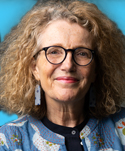 Delia has worked in consumer protection for 30 years, the last 10 or which were as the Deputy Chair of the ACCC. In that role she sat of the ACCC’s Communications and Enforcement committees, was a member of their Digital Platforms board as well as participating in multiple areas involving consumer protection. Her passions include stopping scams and creating a more equitable & sustainable society. She also previously worked senior roles at ASIC where one of her main focuses was financial capability. In 2011 she was awarded the Public Service Medal for ‘outstanding public service in the development of consumer protection for financial services’. She has also been awarded the SOCAP Lifetime Achievement award and in 2022 the Inaugural Australian Law Council’s Australian Consumer Rights award. Delia is currently involved with a range of not for profit organisations including the Australian Financial Complaints Authority; Super Consumers Australia; Good Shepherd’s financial inclusion action plans and the Jan Pentland foundation.
Delia has worked in consumer protection for 30 years, the last 10 or which were as the Deputy Chair of the ACCC. In that role she sat of the ACCC’s Communications and Enforcement committees, was a member of their Digital Platforms board as well as participating in multiple areas involving consumer protection. Her passions include stopping scams and creating a more equitable & sustainable society. She also previously worked senior roles at ASIC where one of her main focuses was financial capability. In 2011 she was awarded the Public Service Medal for ‘outstanding public service in the development of consumer protection for financial services’. She has also been awarded the SOCAP Lifetime Achievement award and in 2022 the Inaugural Australian Law Council’s Australian Consumer Rights award. Delia is currently involved with a range of not for profit organisations including the Australian Financial Complaints Authority; Super Consumers Australia; Good Shepherd’s financial inclusion action plans and the Jan Pentland foundation.
Keith Besgrove
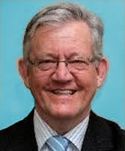 Keith has extensive communications policy/regulatory qualifications after fifteen years as a senior manager in the Department of Communications (2000-2014). During that time, he was pivotal to ACCAN's establishment; to securing its initial funding; and in shepherding ACCAN through subsequent government, four-year reviews.
Keith has extensive communications policy/regulatory qualifications after fifteen years as a senior manager in the Department of Communications (2000-2014). During that time, he was pivotal to ACCAN's establishment; to securing its initial funding; and in shepherding ACCAN through subsequent government, four-year reviews.
Keith has a very wide range of experience of issues relevant to ACCAN. Aside from his work on consumer and disability issues, he developed Australia's first cyber security strategies; over sighted the creation of auDA; crafted legislation to combat spam and internet gambling; established the Do Not Call Register; helped adopt broadband in healthcare and education; managed spectrum sales; and reviewed the TIO. He was responsible for regional and indigenous communications issues for seven years including the second Regional Telecommunications Independent Review Committee, and managed installation of satellite phones and wi-fi points of presence in remote indigenous communities.
Since leaving the Department in 2014, he has worked with many not-for-profit groups, including Financial Counseling Australia and spent 3 years as an advocate at Energy Consumers Australia. He is a Chair of the Funding Committee for Dragon Claw -- a web-based service for rheumatoid arthritis sufferers; a member of the board of an arts company, the CAD Factory; and a governing member of auDA. He is a vice-Chair of Internet Australia, and a member of the ACS’ Profession Advisory Board.
Bobbie Blackson
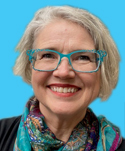 Bobbie is a longstanding member of the Australian Deaf community and has been involved in various paid and non-paid capacities across disability/not-for-profit/government/tertiary sectors spanning 40 years. This has included being the Chair of Deaf Australia, the Chair of Deaf Connect, a member of the Australian Disability Advisory Council as well as a number of state and local organisations. She is a life member and Emeritus Chair of Deaf Connect.
Bobbie is a longstanding member of the Australian Deaf community and has been involved in various paid and non-paid capacities across disability/not-for-profit/government/tertiary sectors spanning 40 years. This has included being the Chair of Deaf Australia, the Chair of Deaf Connect, a member of the Australian Disability Advisory Council as well as a number of state and local organisations. She is a life member and Emeritus Chair of Deaf Connect.
She was a co-founder of Deaflink which saw Australia’s first consumer-driven relay service eventually servicing all of Queensland. Deaflink merged with Deafness Resources Australia to form Australian Communication Exchange which provided the first National Relay Service.
Bobbie has witnessed and supported deaf and hard of hearing people face the challenges of dealing with various traditional and interactive media platforms. Communication technology is potentially an enabler, but also poses many new barriers.
Bobbie lives in rural SE Queensland and has experienced the challenges of adequate reliable communications services. Initially trained as a social worker, she has also gone on to be a Justice of the Peace (Qual), a civil marriage celebrant and is a member and Graduate of the Australian Institute of Company Directors.
Bobbie has lived experience of challenges of navigating life as a deaf person in a hearing focussed, and now voice-activated world.
Chris Dodds
 Chris has been involved in the Community Service Industry for over 40 years in both a paid and volunteer capacity. This has included work as a childcare worker in a Women's Refuge, Coordinator at a Neighbourhood Centre and teaching at both TAFE and University. He served on the Board of NCOSS for 14 years including four year (2002-6) as President. He also served on the Board of ACOSS for eight years including five years on the Executive.
Chris has been involved in the Community Service Industry for over 40 years in both a paid and volunteer capacity. This has included work as a childcare worker in a Women's Refuge, Coordinator at a Neighbourhood Centre and teaching at both TAFE and University. He served on the Board of NCOSS for 14 years including four year (2002-6) as President. He also served on the Board of ACOSS for eight years including five years on the Executive.
Chris represents ACOSS on and is also Chairperson of Telstra's Low Income Measures Assessment Committee (LIMAC) which oversees $200 million of assistance provided by Telstra to low income customers each year.
Daniel Featherstone
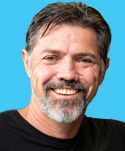 Daniel is a passionate advocate for equitable access to affordable and reliable communications services, with over 20 years of experience in media, communications, and digital inclusion, particularly in remote First Nations communities. Since 2021, Daniel has led the ‘Mapping the Digital Gap’ project at RMIT University, supporting the goal of First Nations digital equity by 2026. Daniel brings first-hand experience from regional Victoria and central Australia, where he managed Indigenous media organisations and initiated programs like inDigiMOB. A long-time supporter of ACCAN, Daniel contributes to policy submissions and advocacy efforts, and is eager to further support ACCAN’s mission on the Board.
Daniel is a passionate advocate for equitable access to affordable and reliable communications services, with over 20 years of experience in media, communications, and digital inclusion, particularly in remote First Nations communities. Since 2021, Daniel has led the ‘Mapping the Digital Gap’ project at RMIT University, supporting the goal of First Nations digital equity by 2026. Daniel brings first-hand experience from regional Victoria and central Australia, where he managed Indigenous media organisations and initiated programs like inDigiMOB. A long-time supporter of ACCAN, Daniel contributes to policy submissions and advocacy efforts, and is eager to further support ACCAN’s mission on the Board.
David Havyatt
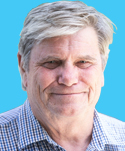
David had a 35-year career in telecommunications that was structured in the reverse to many others. Post University he started as a clerk in old fashioned customer account teams, worked his way up to General Manager roles in Sales and Strategy, then morphed into a regulatory specialist before ending up in a Minister's office. Post his telco career he spent five years as Senior Economist at Energy Consumers Australia and after retiring spent the last three still focussed on energy consumer issues.
He brings to ACCAN extensive governance and regulatory experience. His regulatory experience has been primarily in industry, though he was particularly focussed on roles improving consumer experience. He served on the Boards of CommsAlliance, AMTA and the TIO as well as being Chair of the Board of Endeavour Credit Union and the Glen Street Theatre.
David prides himself on being a creative thinker who looks for the less obvious answers to “wicked” problems.
Dr Scott Hollier
 Dr Scott Hollier specialises in the field of digital accessibility and is the CEO and co-founder of the Centre For Accessibility Australia, a not-for-profit organisation dedicated to alleviating hardship caused by digital access issues. With a Ph.D. in Internet Studies and senior management experience across the not-for-profit, corporate and government sectors, Scott is an internationally-recognised researcher and speaker.
Dr Scott Hollier specialises in the field of digital accessibility and is the CEO and co-founder of the Centre For Accessibility Australia, a not-for-profit organisation dedicated to alleviating hardship caused by digital access issues. With a Ph.D. in Internet Studies and senior management experience across the not-for-profit, corporate and government sectors, Scott is an internationally-recognised researcher and speaker.
Scott’s other roles and achievements include Finalist for 2022 Australian of the Year, holds academic positions at Edith Cowan University and the University of South Australia, and is an Invited Expert for the W3C Accessible Platform Architectures Research Questions Task Force. In addition, Scott is legally blind and as such has both a professional and personal understanding of the importance of accessibility.
Robert Morsillo
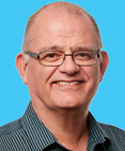 Robert brings over four decades of expertise in not-for-profit governance and extensive experience in telecommunications and consumer advocacy. Robert’s diverse educational background, which includes a BSc, an MA in Communications, and a focus on community development and public policy, uniquely positions him to contribute to ACCAN’s mission. He brings 40 years of experience in governance roles across various organizations, including Infoxchange, 28 years at Telstra in consumer affairs and digital inclusion, and 15 years in community work.
Robert brings over four decades of expertise in not-for-profit governance and extensive experience in telecommunications and consumer advocacy. Robert’s diverse educational background, which includes a BSc, an MA in Communications, and a focus on community development and public policy, uniquely positions him to contribute to ACCAN’s mission. He brings 40 years of experience in governance roles across various organizations, including Infoxchange, 28 years at Telstra in consumer affairs and digital inclusion, and 15 years in community work.
As a research fellow and PhD student at RMIT, specialising in digital social innovation, Robert is committed to fostering cross-sector collaboration to enhance communication access for vulnerable groups. Through his involvement with the ARC Centre of Excellence for Automated Decision-Making and Society, he aims to bring valuable insights into the social impacts of emerging technologies, ensuring ACCAN continues to advocate for those at risk of exclusion in our rapidly evolving digital landscape.
- Details
The Australian Communications Consumer Action Network (ACCAN) is Australia’s peak communications consumer organisation representing individuals, small businesses and not-for-profit groups as consumers of communications products and services. ACCAN focuses on goods and services encompassed by the converged areas of telecommunications, broadcasting, the internet and online services, including both current and emerging technologies.
We aim to empower consumers to make good choices about products and services. As a peak body, ACCAN will represent the views of its broad and diverse membership base to policy makers, government and industry to get a better outcome for all communications consumers. Member groups include community legal centres, disability advocates, indigenous organisations, financial counsellors, regional organisations, farmers’ federations, parents groups, seniors organisations and other individual members.
The operation of ACCAN is made possible by funding provided by the Commonwealth of Australia under section 593 of the Telecommunications Act 1997. This funding is recovered from charges on telecommunications carriers.
ACCAN administers a Grant Program as part of its funding agreement with the Commonwealth Department of Communications. The aims of the Program are to support consumer research and representation that is aligned with ACCAN’s strategic plan.
- Details
The purpose of the Small Business Advisory Forum (SBAF) is to discuss the most important telecommunications consumer issues from the perspective of key representative in the small business environment and the people they represent, with a view to incorporating these into ACCAN's work priorities.
- Details
The purpose of the Indigenous Steering Committee (ISC) is to discuss the most important telecommunications consumer issues from the perspective of key representative in the Indigenous consumer/community's environment and the people they represent, with a view to incorporating these into ACCAN's work priorities.
- Details
The summary below outlines ACCAN's activities from 1 March to 31 May 2015.
- Details
Summary of ACCAN's activities from 1 December 2014 to 28 February 2015.
- Details
Summary of ACCAN's activities from 1 September to 30 November 2014.
- Details
Summary of ACCAN's activities from 1 June to 31 August 2014.
- Details
Summary of ACCAN's activities from 1 March to 31 May 2014.
- Details
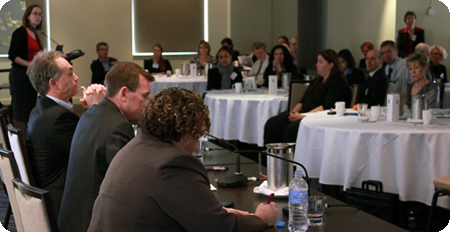
As part of our commitment to community and industry consultation, ACCAN runs a number of events each year. Our current and upcoming events can be found on this page. ACCAN encourages its Members to profile their communications events through our website.
If you would like any further information regarding our events, or to include your event on our site, please contact us.
You can see the speakers' presentations from the ACCANect 2018: Confidence in the connected world on the conference event page. If you are looking for information regarding past events it can be found in the events archive.
- Details

ACCAN values disability access. We want to be a model in this field, for other not-for-profits, industry and government. ACCAN has registered our 2022-2024 Disability Inclusion Action Plan with the Australian Human Rights Commission’s Register of Disability Discrimination Act Action Plans.
Through enacting our Disability Inclusion Action Plan, ACCAN aims to:
